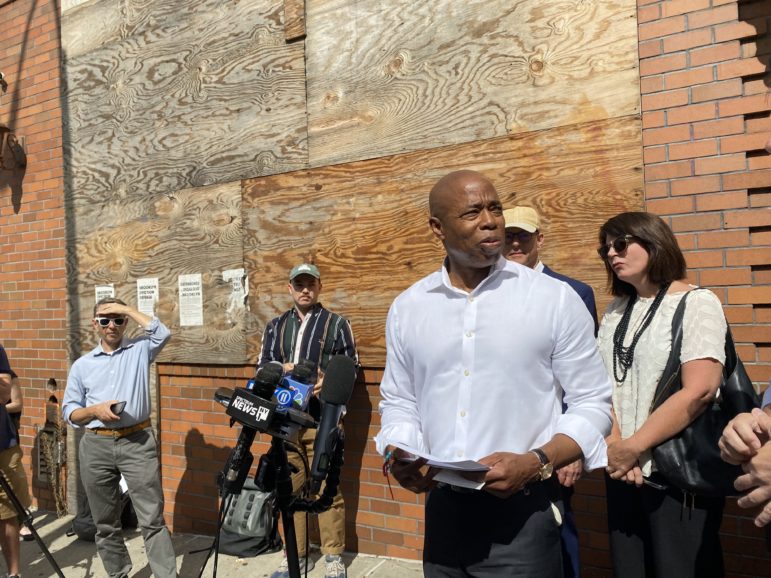
David Brand
Eric Adams at a press conference in Brooklyn this summer, announcing his plans to address homelessness.New York City’s incoming mayor will soon inherit a decades-long homelessness crisis insufficiently addressed, and at times worsened, by his past three predecessors. So what will Eric Adams do differently?
Three formerly homeless moms have some ideas. They shared their experiences and advice during a forum Tuesday organized by the Family Homelessness Coalition (FHC) and Trinity Wall Street (City Limits funders). The event was moderated by City Limits Executive Editor Jeanmarie Evelly.
The first solution: Link families who need homes to available housing.
Martha, a mother of two who asked that City Limits use only her first name, said she spent six years in shelters after leaving an abusive partner but struggled to enroll and apply for apartments through the city’s Housing Connect portal, which lists apartments for rent and allows users to sign up for lotteries.
“I would say to the new mayor and councilmembers that they should think more about the single mothers because I had to wait four years to find my apartment through Housing Connect and the problem was always how to enroll in the program,” she said.
Kadisha Davis, another panelist and host of FHC’s podcast Hear Our Voices, urged Adams and his administration to engage directly with homeless families to find out what they need to avoid shelter and find and maintain permanent housing.
“We are shouting it, but you’re not listening to us,” Davis said. “Get a whole group of people who have experiences and they can tell you what the problems are. All you have to do is listen.”
That includes calls for the city to place families in shelters closer to their communities, and to children s’ schools. She said she and her daughter spent hours commuting to and from a shelter near LaGuardia Airport to her daughter’s school—a process that left the grade-schooler exhausted each day.
“The travel took a lot out of her,” she said. “Every day we have to wake up at 5 in the morning and not get home until 8 or 9 [p.m.].”
“I didn’t get to spend that quality time with her,” Davis added. “But I made sure the weekends were filled with joy.”
Adams and his team will have their work cut out for them when it comes to addressing family homelessness—a population that makes up the bulk of the Department of Homeless Services (DHS) shelter population.
More than 8,500 families with 14,861 children stayed in a DHS shelter on Dec.13, according to the city’s most recent daily census. Still more spent the night in transitional residences for survivors of domestic violence operated by the Human Resources Administration.
In recent years, the number of families staying in DHS shelters has decreased—the result, the agency says, of staff efforts and preventive initiatives, like a right to a Housing Court lawyer and rental assistance vouchers. Statewide eviction protections have also kept low-income New Yorkers in their apartments since March 2020.
But families who do end up in DHS shelters now stay there for an average of almost 18 months, according to the latest Mayor’s Management Report. That’s three months longer than in 2017.
The majority of those families are headed by single mothers of color, the face of homelessness in New York City. The approaching end of pandemic-related eviction protections threatens to only fuel another increase in homeless families.
FHC members are calling for the next administration to undertake a number of policy recommendations, including appointing a deputy mayor to oversee housing and homelessness, adequately staffing the agencies and programs that serve homeless families and strengthening initiatives like the city’s One Shot Deal, which provides financial assistance to New Yorkers at risk of eviction.
Rhonda Jackson, another mother who spent time in city shelters who participated in the forum, said the impact of homelessness on kids can last a lifetime.
“Going through shelter is really hard on the children,” Jackson said. “As parents or grown-ups, we can adapt a little more. But the children suffer in silence.”
As the event Tuesday came to a close, Councilmember Stephen Levin praised the three speakers for having the courage to share their experiences and ideas.
“The work of advocacy is absolutely essential because that’s the spark that gets politicians and elected officials to pay attention,” said Levin, the outgoing chair of the General Welfare Committee. “And it always will take a lot of perseverance.”
Watch the full forum discussion below.
City Limits’ series on family homelessness in New York City is supported by Citizens’ Committee for Children of New York and The Family Homelessness Coalition. City Limits is solely responsible for the content and editorial direction.








